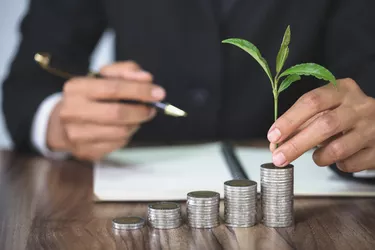
Tangible investing means putting your money into assets that have a physical form, as opposed to paper assets like stocks and bonds. Typically, investors are attracted to tangible assets during periods of economic uncertainty or high inflation. Tangible assets are viewed as being less likely to lose value and so can serve as a hedge against economic adversity. You need to distinguish between risky tangible investments and the best tangible assets in terms of safety.
Tangible Investment Safety and Risk
Video of the Day
Risk in investment terms is the chance that you will lose money or that expected profits won't materialize. Investments with low risk are generally considered the safest. There are several types of risk typically associated with tangible investing.
Video of the Day
Market risk is the possibility the market price of a tangible investment will decline. Some tangible properties are vulnerable to damage or theft. Another risk is that storage fees, insurance and other costs will offset the benefits of a tangible investment. With other tangible investments like precious metals, art and so forth, you don't receive any interest or dividends, as you do with stocks, bonds and savings accounts.
Consider also: What Is the Relationship Between Financial Risk & Financial Return?
Gold: The Traditional Safe Haven
Gold bars and coins have long been considered a good hedge or safe haven against economic uncertainty and inflation. Unlike stocks, the metal tends to hold its value under these conditions or to increase in price. Another safety characteristic is that gold is virtually indestructible. It does not depreciate over time and is all but immune to corrosion.
Investing in gold isn't risk free. You have to guard against theft. Safekeeping can be fairly simple since a substantial amount will fit in a safe deposit box. The chief risk an investor faces is that gold prices can be volatile since the metal attracts day traders and speculators.
Consider also: The Best Way to Buy Gold Coins
Some Safe Collectibles
People collect just about anything, but not all collectibles are safe investments. Some are, however, safer bets than others. Items like fine art, rare coins, wine and stamps tend to hold their value or appreciate over time. The price of these tangible assets doesn't depend on economic conditions as much as prices for financial instruments like stocks and bonds.
Collecting does take work. To choose a good investment, you need to learn about the things you buy. For example, if you want to buy art you should be familiar with the artist's work so you can select a quality piece that may grow in value over time. Another thing to be aware of is that collectibles can be stolen and many are susceptible to damage, so you must safeguard and care for them.
The market for some collectibles may be affected by changing consumer tastes – the collector's items that may be all the rage this year may be passé next year, and prices can plummet. This happened with Beanie Babies in the late 1990s, when their value soared to 50 times their retail price, followed quickly by a crash in demand and value.
Property as a Tangible Investment
Real estate, whether it's land or a developed property, is not something a thief can make off with. Plus, real estate tends to grow in value in the long run.
These features mean real property can be a very safe tangible investment. The downside is that real estate markets can turn sour and property values may fall. Unless you are able to ride out market downturns, you could find yourself forced to sell a property at a loss.
Owning real estate can also be a lot of work, especially if it's a rental property. You'll have to manage the property, find tenants and pay costs such as maintenance and taxes out of the income the property produces. With undeveloped land, you have to hope that appreciation in the price of the land over time is greater than the property taxes you have had to pay.
Consider also: Here's Who Should Invest in Real Estate